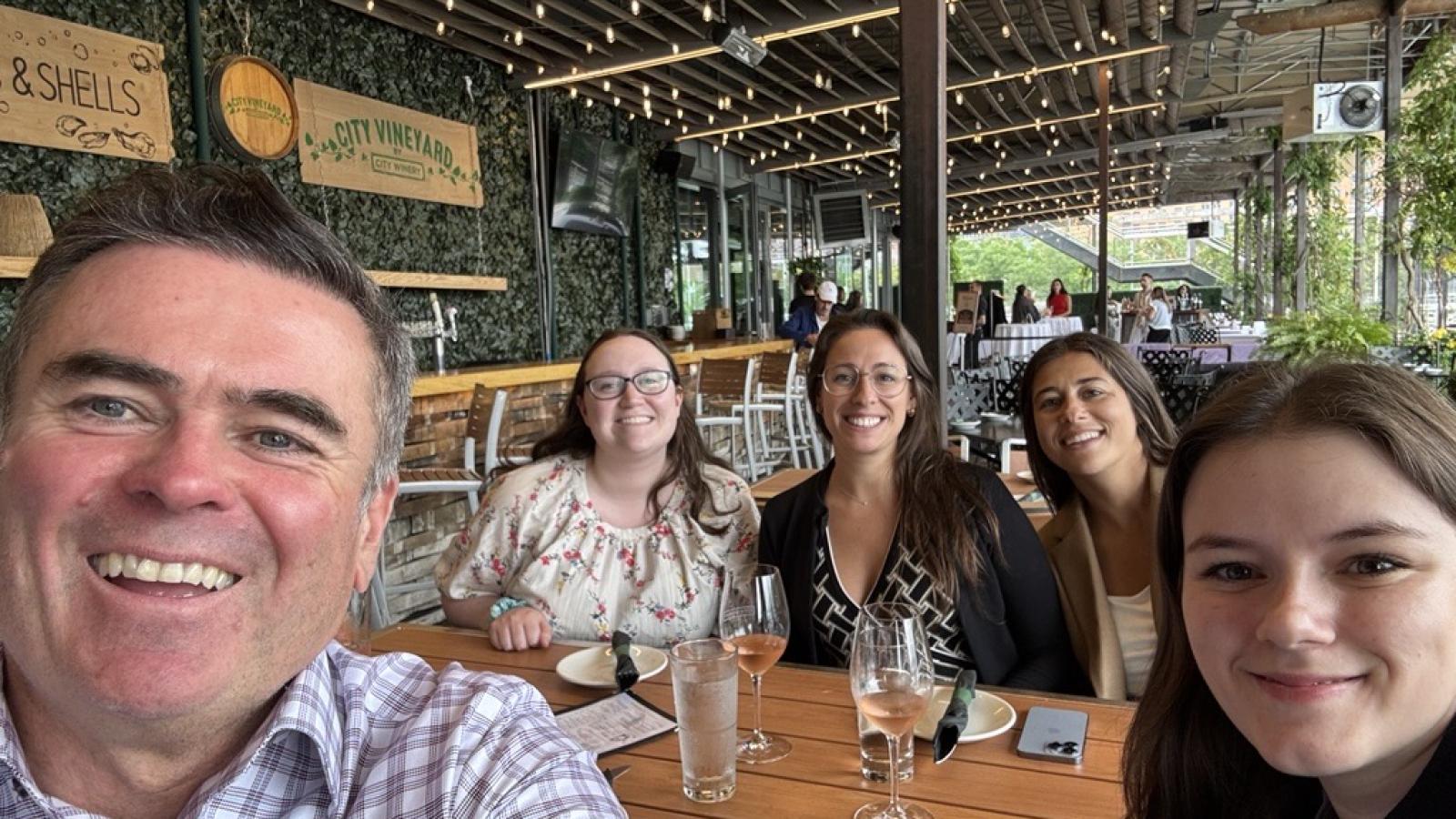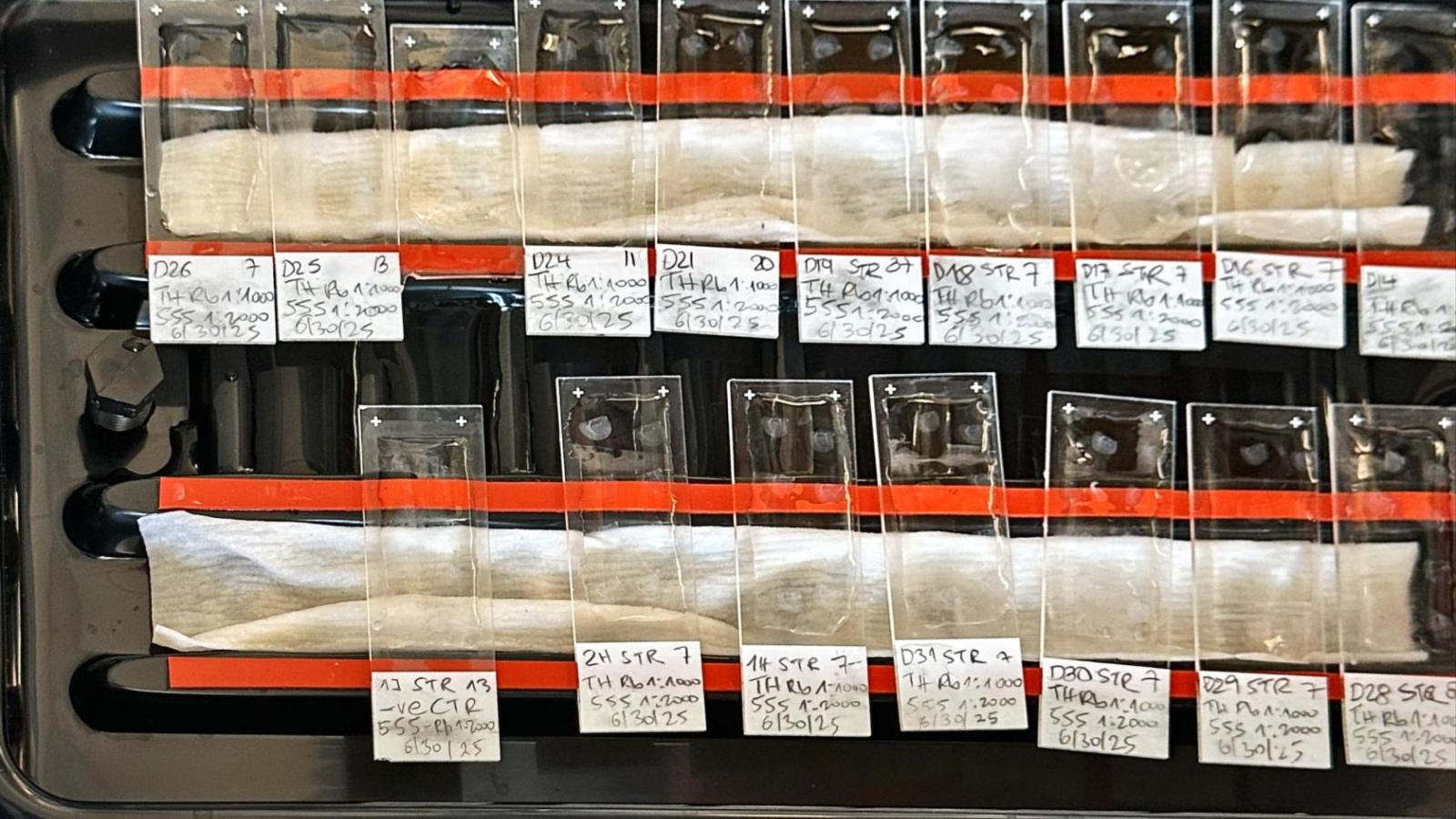Applied Practice Experience (APEx)
Environmental Health Sciences Master's students are required to complete a three-month practicum. The practicum—essentially an internship in the field—is both a required component and highlight of the Master's experience. Our students work alongside public health professionals, experience the day-to-day realities of the field, and apply what they’ve learned in class to advance the cause of public health.
2025
A selection of 2025 Applied Practice Experiences
- Neural Biomarkers and Gene X Environment Interactions in Neurodegeneration Lab
Studying the effects that vape aerosols have on the brain - UC Berkeley
Examining farmworker time activity patterns - MSF's Central America and Mexico Integrated Office (CAMINO)
Arbovirus prevention in Honduras - Providing litigation support to environmental lawyers
- METALab
Investigating vaginal exposure to metals from menstrual products
-
Robert N. Butler Columbia Aging Center
Developing a curriculum for heat-related illness prevention workshops held at senior centers across NYC -
Insight Exposure and Risk Assessment Sciences
Writing reports about the toxicological, epidemiological, and regulatory implications of different chemicals and the risk from exposures
2024
- Alameda County Public Health Department
Implementing photovoice as an evaluation tool and acting as a photovoice liaison for community partners - Ami Zota Lab, Mailman School of Public Health
Assisting with the Silk Press Swap Study and conducted a literature review and analysis related to how climate change and hurricanes impact abortion access in the southern United States - Ana Navas-Acien, Mailman School of Public Health
Researching blood DNA methylations data on the Strong Heart Study involving Native American populations - APTIM
Authored a public health blog series on the importance of environmental health, climate change, radon, and heat resilient cities - Coffee Elf Inc.
Conducting market analysis on sustainable personal care products and designed a sustainable marketing plan - Columbia Center for Children’s Environmental Health, Mailman School of Public Health
Analyzing data on community rice preference and arsenic in urine and rice samples - Columbia World Projects
Designing survey tools to combat household air pollution in Ghana - Consulting Testing Services Inc. (CTSI)
On-site inspections taking indoor air quality, water and fungal samples and preparing building engineers for state inspections and building safety regulations - COVID-19 Mother Baby Outcomes (COMBO) Initiative
Creating documentation for survey tools and creating REDCap surveys to assess mental well-being and social support - Eco-Epidemiology Lab, Mailman School of Public Health
Analyzing the transmission and public perception of tick-borne diseases in urban greenspaces - Environmental Working Group
- Briefing a legal team on current scientific literature and policies/regulations regarding toxic chemicals in various industries
- Conducting research on critical issues in food systems and examining food brands making false claims about their environmental impact
- H.E.A.L.T.H. for Youth
Staten Island community health needs assessment survey - ICF
Supporting literature reviews that identify environmental exposure relationships with health outcomes from public sector clients - Kleiman Laboratory, Mailman School of Public Health
Assessing the health hazards associated with far-UVC exposure, a wavelength of radiation capable of inactivating airborne viruses - Mailman School of Public Health
Testing a collection of urine samples to determine selenium speciation - mistEO
Conducting a review on climate and health risk assessment frameworks - New York City Department of Health and Mental Hygiene
Improving the agency’s understanding of indoor air quality interventions - New York City Department of Health and Mental Hygiene, Bureau of Communicable Diseases
Interviewing individuals with Salmonella and tracking outbreaks in New York City - New York City Department of Health and Mental Hygiene, The Fund for Public Health
Interviewing mobile food vendors and commissary operators about sanitation practices and business operations - New York League of Conservation Voters
Participating in a project to lower the current action level of lead in drinking water in school districts from 5ppb to 1ppb - Norman Kleiman, Mailman School of Public Health
Researching radon concentrations and climate change in Pennsylvania - The Trustees of Columbia University in the City of New York
Analyzing arsenic levels in soil and water samples - Universidad de Cienfuegos
Agricultural site visits and literature review around socio-environmental education and pollution in Cienfuegos Bay - University of Washington
Digitizing maps for health data across all counties in the United States - Waterfront Plan
Collecting data on green space conditions in various neighborhoods and comparing them to the Bronx - Weill Cornell Medicine
Working on studies focused on further understanding and optimizing kidney transplant outcomes
2023
- Catalent Pharma Solutions
Completing hazardous waste inspections and conducting risk assessments on various processes and their potential hazards - Civilience Company
Developing questionnaires for the top 50 infectious diseases and creating a logic mapping for software development - The Collaborative for Women's Environmental Health at Columbia
Researching patient and clinician education for women's health and environmental exposures - Columbia University
Performing noise monitoring throughout Inwood and Washington Heights, then creating data visualizations - Columbia University and Natural Resources Defense Council
Using R to analyze exposomics and access the relationship between CBD oil products and common environmental contaminants through data analysis and visualization - Environmental Health Sciences Department, Mailman School of Public Health
- Translating questionnaires about arsenic exposure and rice consumption
- Analyzing data to identify potential metabolomic signature related to exposure to metals and development of asthma
- Studying the behavior and metal acclimation in the body of mice exposed to e-cigarettes
- Geo-mapping environmental reparations cases using R, then developing a dashboard app
- Analyzing the links between malnutrition and heat stress tolerance
- Analyzing data and creating visualization using R for the Laboratory of Precision Environmental Health
- Writing R code to create a tool that communicates lead concentration data in Public Water Systems to residents
- Optimizing a protocol for urinary extracellular vesible isolation in order to study kidney disease biomarkers in samples from Sri Lankan children experiencing heat stress
- The Farmworker Association of Florida, Inc.
Conducting research on culturally competent care for migrant farmworkers with a focus on environmental and occupational exposures - Harvard University
Interpreting data and writing a manuscript - Maximon Behavioral Health
Reporting on productivity data and daily incidents - New York League of Conservation Voters
Analyzing lead contamination reports for public school drinking water outlets - New York Presbyterian
Literature analysis to determine effects of hospital visitors on the patient's risk of malnutrition - New York State Attorney General Office
Aiding legal investigations by providing scientific expertise to lawyers and other professionals - NGO Sustainability
Maintaining a newsletter on climate change, sustainable development, renewable energy, and environmental health - The Rockefeller Foundation
Co-authored a paper and served as a content editor, focusing on biomolecules in food and their impact on nutrition and health - TreePeople
Geocoding spatial soil data from fine satellite imagery to create maps of social and impervious surface in urban LA - WE ACT for Environmental Justice
- Developing youth education modules to teach young people about environmental justice topics
- Communicating about hazardous chemicals to avoid in cosmetic products
- Coding for an R Shiny interface on air quality monitoring and wrote a policy paper on bioplastics and environmental justice
- Wellness Equity Alliance
Environmental health research for a Community Health Needs Assessment
2022
- Arch Street Communications
Communication and public engagement for environment-related projects - Biostatistics Department, Columbia University
Concussion protocol data collection and analysis - Brightline Defense
Analyzing climate data and policy - Citizens Climate Lobby
Community-based climate advocacy - Clarity Movement Co.
Project management and climate data and policy analysis - Climate Club
Developing science blog posts, creating visualizations, increasing readership and discovering grant opportunities - Columbia Center for Children's Environmental Health, Mailman School of Public Health
Researching consequences of prenatal exposure to environmental contaminants on child health outcomes - CUNY Urban Food Policy Institute
Applying an intersectoral perspective that links nutrition and health to a sustainable community for Harlem, and engaging the public in food policy research and action - Doctors Without Borders/Medecins Sans Frontieres Brazil Medical Unit
Developing surveys to analyze the relationship between climate events, migration and health - Department of Immigrant Health and Cancer Disparities, Memorial Sloan Kettering Cancer Center
Food pantry site distribution, data collection and analysis - Environmental Health Sciences Department, Mailman School of Public Health
- Troubleshooting protocols for aerosol collection and immunostaining of various target organs with markers present in ALS patients
- Determining the impact of metal exposures on child neurodevelopment
- Data management and analysis, updating recruitment statistics
- Investigating the relationship between wastewater surveillance data and underlying rates of infection
- Collecting and analyzing data for the "450K Epigenome-Wide Scan Identifies Differential DNA Methylation Related to Aflatoxins Exposure" project
- Measuring environmental noise
- Environmental Protection Agency
Clean Water Act (CWA) inspections and developing new enforcement cases against CWA violators - Environmental Working Group
Researching projects surrounding the Farm Bill and Trade Policy - Environmental Volunteers
Managing research, community engagement and communications for an environmental science education program for 1st and 2nd-grade students in low-income communities - Global Consortium on Climate Health and Education
Educating the public and analyzing data about climate change and its impact on human health - ICAP Global Health
Examining how mobility influences access and utilization of care for migrants living with HIV in Zimbabwe and Lesotho - National Center for Disaster Preparedness
Pandemic planning course curriculum development



